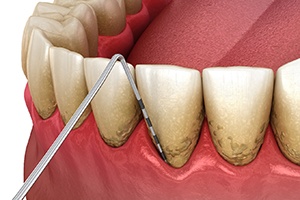Periodontal Disease Treatment in Worcester, MA

Periodontal disease, which is also known as gum disease, is an infection that gradually affects the structures supporting your teeth. It often begins painlessly, with no discernible symptoms. In fact, most patients struggling with periodontal disease don’t even know they have it until their dentist makes the diagnosis.
What Causes Periodontal Disease?
Periodontal disease is caused in part by bacteria. When harmful bacteria collect on the surfaces of teeth, a colorless film called plaque begins to form. If bacterial plaque isn’t removed through brushing, flossing, and routine dental cleanings, an infection will develop. Plaque can quickly combine with minerals and salts in your mouth to form a harder substances called tartar or calculus. Tartar is too tough to be removed with brushing and flossing at home; it must be treated by a dental professional.
What Is Periodontitis?
In addition to spawning plaque and tartar, the bacteria in our mouths produce toxins that trigger an immune response in the gum tissue. Gums may appear red or swollen, and bleed when you brush. If periodontal disease is treated early, it’s reversible. If it’s not treated early, bacterial toxins can advance over the surfaces of teeth to affect the bone beneath. This advanced, destructive form of periodontal disease is called periodontitis.
Advanced periodontitis can cause teeth to feel loose and eventually cause tooth loss. In fact, periodontal disease is responsible for more cases of tooth loss than decay.
Contributing factors that also affect your gum health include:
- Smoking
- Diabetes
- Nutrition and medications
- Teeth grinding or clenching
- Stress
- Family History
Recent data has also found that periodontal disease may put you at risk for various systemic conditions, including:
- Heart disease
- Respiratory disease
- Premature delivery or low birth weight pregnancy
- Diabetes
Scaling & Root Planing

Depending on the status of your gum health, it may be necessary for us to perform scaling and root planing as a way to avoid more serious periodontal disease or even treat advancing plaque and tartar that has spread beneath the gum line. As a non-surgical treatment, it is one of the most commonly used methods of treatments periodontists and dentists use to curb the negative effects of periodontal disease while also improving gum health.
Understanding the Cost of Periodontal Disease Treatment

There is no “one size fits all” cost of periodontal disease treatment in Worcester. Depending on the specifics of your case, you may end up spending several hundred dollars or even thousands of dollars. During your consultation, our team will assess your needs and provide you with a price estimate. Rest assured that your treatment will be a worthwhile use of funds. It can restore your oral health, relieve oral pain, and reduce your risk of numerous system health problems. Plus, insurance and other provisions may be able to help you afford the care you need.
Factors that Affect the Cost of Periodontal Disease Treatment

Some factors that influence the cost of periodontal disease treatment include:
- Which treatment you undergo. Antibiotics, scaling and root planing, and various kinds of surgery all fall into the category of “periodontal disease treatment.” Each service comes with its own unique price. More invasive procedures tend to have a higher cost.
- The severity of your condition. Mild cases of gum disease are generally much easier to treat — and therefore less costly — than severe cases. You can save money by seeking treatment as soon as possible!
- The number of follow-up appointments needed. Our team will want to monitor your recovery from gum disease. The number of follow-up appointments needed will depend on which treatment you undergo and your risk factors for suffering from recurrent gum problems.
Does Insurance Cover Periodontal Disease Treatment?

Most dental insurance plans do cover gum disease treatment. Depending on your policy and the specifics of your treatment plan, your insurance may cover 50 – 80% of the cost of your treatment, up to the amount of your plan’s annual maximum. Many patients end up saving hundreds of dollars of more off the price of their procedure. Our team will help you navigate your benefits and file all necessary claims with your insurance company.
In some cases, medical insurance can also reduce patients’ out-of-pocket costs for periodontal disease treatment. You will have to contact your policy provider to find out how your coverage might apply.
How to Afford Your Treatment

Whether or not your insurance will help pay for your treatment, you may be eligible for low-interest financing. CareCredit, a third-party company, offers convenient payment plans to help patients afford a range of dental and medical procedures. The application process is quick, and most people qualify for credit. You may even be able to choose from a variety of payment plans according to what works best for your monthly budget.
Would you like to learn more about the cost of periodontal disease treatment? Our team is ready to answer your questions. Get in touch with us today to schedule a consultation.
Periodontal Disease FAQs

Whether you are currently facing the reality of having periodontal disease (gum disease) or you simply want to know what to do to avoid this common dental problem, you likely have a host of questions you would like to ask our team. At Handsman & Haddad Periodontics, P.C. your periodontist in Worcester believes in providing transparent, honest advice and information to patients, which is why we’ve compiled some FAQs about periodontal disease. If at any point you need clarification or have additional inquires, we invite you to contact our office.
How can I avoid periodontal disease?
The most effective way to avoid bad bacteria from attacking your gums is to maintain a good oral hygiene regime. This includes brushing twice daily for two minutes using a soft-bristled toothbrush and fluoride toothpaste as well as flossing before bed and rinsing with an ADA-approved mouthwash. It is also beneficial if you stop smoking and avoid eating too many sugary or starchy foods, as these can easily stick to your teeth and cause bacteria to eat away at the tooth enamel and plaque to accumulate around your gum line.
Will it hurt to undergo periodontal therapy?
It’s important to know that no matter how your periodontist decides to treat your gum disease, your comfort and safety are of the utmost importance. Whether we opt for scaling and root planing or gum/soft tissue grafting, you will receive a numbing agent that will help to keep you comfortable and avoid feeling any discomfort during the treatment process.
It is natural for your gums to feel tender and sore after both a surgical and non-surgical procedure, so if you’re prescribed an antibiotic or any other form of medication, make sure to take it as directed.
What happens if my teeth cannot be saved?
If your periodontal disease in Worcester has progressed beyond the point of being able to save your teeth, it will be necessary for us to extract these teeth and allow you to heal completely. Once your gums and bone are in better condition, we can begin discussions regarding tooth replacement. No matter if it is dental implants or Teeth in a Day, our team can identify the right treatment solution for you so that you can return to enjoying a full, complete smile once again.
Will my dental insurance cover gum disease therapy?
When looking at the financial side of periodontal therapy, you may be wondering how much your out of pocket costs will be. Fortunately, most dental insurance companies cover, in some capacity, treatment for gum disease. The level of coverage is based on your individual plan, so you will need to contact a representative from your insurance company to find out how much of your treatment will be paid for by them versus how much will be your responsibility.
No matter the result, our team can help to find other ways you can stay within your budget and make manageable payments to receive the care you need.
How will I know if I have periodontal disease?
Your best option for catching periodontal disease as early as possible is to schedule biannual dental checkups and cleanings. That being said, there are several symptoms that can indicate an issue with your gum health:
- Your gums may be unusually red or tender.
- You may experience bleeding when brushing, flossing, or chewing on particularly hard foods.
- You might develop persistent bad breath.
- Some of your teeth might start to come loose or become more sensitive than normal.
- Your teeth may look longer due to gum recession.
You should seek a diagnosis from a professional as soon as possible if you suspect that you might have gum disease; the problem will only grow more severe if it is ignored for too long.
Can periodontal disease cause a heart attack?
The connection may not be immediately obvious, but studies performed in recent years indicate that individuals with periodontal disease tend to have a higher chance for heart attacks as well as other cardiovascular issues. This relationship could be a result of the bacteria responsible for periodontal disease entering the bloodstream and causing inflammation of the arteries. It’s also worth noting that a number of risk factors for heart problems, such as smoking, can also be linked to periodontal disease.
Regardless of whether periodontal disease can directly lead to heart problems, having the issue treated as quickly as possible is the best decision for your oral and overall health.
Will I need surgery for periodontal disease?
The answer can vary from patient to patient. If your periodontal disease was caught relatively early, it may be possible to treat it without resorting to a surgical approach. However, surgery may be needed in specific cases depending on the overall state of your mouth.
For example, if gum disease has damaged your jawbone, osseous surgery might be necessary. This procedure involves smoothing out the roots of the teeth and recontouring the bone, which can go a long way toward reducing any pockets that have formed between your teeth and gums. (Note that even after osseous surgery, periodontal disease will still be present; the procedure is meant to address the damage that your jaw has suffered.)
How long does scaling and root planing take?
The timeline for scaling and root planing can vary from patient to patient. In many cases, the process can take about one to two hours. However, the exact length of time depends on how severe your periodontal disease is as well as how many teeth are involved. Additionally, more than one visit might be needed.
How are periodontal disease and diabetes related?
Uncontrolled diabetes can increase the chances of an infection occurring in your mouth. Additionally, the inflammation caused by gum disease can lead to higher blood sugar levels. In other words, diabetes and gum disease can make each other worse, thus making it all the more vital to seek professional treatment as quickly as possible.

